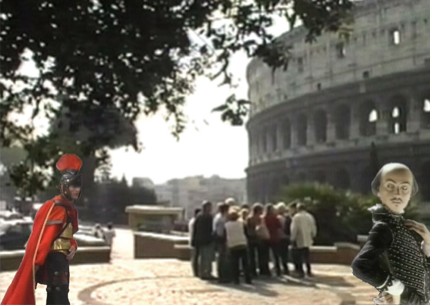
IDENTITY OTHERNESS EMPIRE

Description:
From his Ovidian poem The Rape of Lucrece (1594) to the Roman plays (Titus Andronicus, Julius Caesar, Antony and Cleopatra, Coriolanus, Cymbeline) and through frequent references in the rest of his works, (Hamlet, for example), Shakespeare continued to reflect upon ancient Rome, and its set of values. The Roman world was for him and for the Elizabethans in general not simply a source for plots and themes, but the model of an imperial culture on which a strong sense of nationhood could fashion itself, thus becoming the nourishment for an annexationist literature anxious to compete with the European renaissance standard. This process was sustained by an intense activity of translation of works of Latin culture and by a more or less evident logic of translatio imperii which identified the English as the natural heirs of Roman virtue.
The conference aims to reflect on the complex dynamics of identification and difference through which this happened, focusing on the position held by otherness in the definition of identity, and on the ways this calls attention to questions of race, ethnicity and gender.
Speakers:
Maria Del Sapio (Università degli Studi Roma Tre): Banquets and Betrayals: A Welcome Speech
Janet Adelman (Univ. of California, Berkeley): Roman Hunger: “Who does the wolf love?”
Carlo Pagetti (Univ. Statale di Milano): La memoria di Roma: Shakespeare e il teatro della storia
Giuseppe Leonelli (Univ. degli Studi Roma Tre): I drammi del potere: Shakespeare e Alfieri
Paola Colaiacomo (Univ. di Roma “La Sapienza”): “A Garment out of Fashion”: il gioco dell’indumentalità in Cymbeline
Michael Cronin (Dublin City University): Shakespeare’s Other Island. Translation and the Politics of Proximity
Gilberto Sacerdoti (Univ. degli Studi Roma Tre): Antony and Cleopatra and the Overflowing of the Roman Measure
Manfred Pfister (Freie Universität, Berlin): Acting the Roman: Coriolanus
Laura Di Michele (Univ. degli Studi de L’Aquila): Shakespeare’s Rome. Drama, Politics, Empire
Seminar participants:
Barbara Antonucci (Univ. degli Studi Roma Tre): Romans versus Barbarians: Who Speaks the Language of the Empire in Titus Andronicus?
Annamaria Cimitile (Univ. di Napoli “L’Orientale”): A Lesser Rome: the Politics of “Othering” and the Empire Within
Drew Daniel (Univ. of California, Berkeley): “I am more an antique Roman than a Dane”: Suicide, Masculinity and National Identity in Hamlet
Paola Faini (Univ. degli Studi Roma Tre): A Man Calling Himself Caesar
Marcela Kostihova (Hamline Univ., Minnesota): Pisias Vindicated: Shakespeare’s Revision of Plutarch’s Eroticon in Venus and Adonis
Maddalena Pennacchia (Univ. degli Studi Roma Tre): Antony’s Ring: Erasing Rhetoric
Iolanda Plescia (Univ. di Roma “La Sapienza”): “Orts, scraps and fragments”: Identity and Empire in Troilus and Cressida and Between the Acts
Nancy Isenberg (Univ. degli Studi Roma Tre): Shakespeare’s Rome in Rome’s Wooden’O’
Steering Committee: Maria Del Sapio (coordinator),
Nancy Isenberg, Maddalena Pennacchia
For further information: isenberg@uniroma3.it